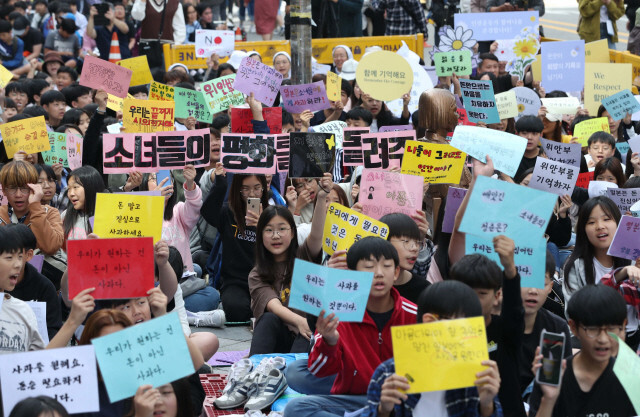hankyoreh
Links to other country sites 다른 나라 사이트 링크
Seoul court to proceed with comfort woman case against Japan

A damages lawsuit that 21 comfort women victims and surviving family members filed against the Japanese government in the Seoul Central District Court back in December 2016 is finally set to begin nearly three years later, with oral arguments scheduled for Nov. 13. Now that the key historical issues like forced labor and the comfort women are being dealt with in the courts, the outcome of the lawsuit is likely to have a major impact on South Korea-Japan relations.
Former comfort women told the Hankyoreh that the plaintiffs had filed their damages lawsuit, asking for about 100 million won (US$85,926) per plaintiff, in order to exercise their rights to compensation and to force the Japanese government to take direct legal responsibility for crimes committed during the colonial occupation of Korea (1910-1945). The plaintiffs were unhappy with the “political collusion” behind the comfort women agreement signed by South Korea and Japan in December 2015, which did not hold Japan responsible for crimes against humanity.
The Japanese government had been delaying the trial by refusing to accept the lawsuit documents, but the trial is finally commencing after the court posted the relevant documents on its message board this past May. This “service by public notice” allows the court to assume that Japan has been served the necessary legal documents.
First issue revolves around Japan’s state immunityOne of the biggest questions and controversies about this lawsuit is whether the trial will actually go ahead. Since the defendant is the Japanese government, the court must first determine whether Japan can claim state immunity before proceeding with the damages lawsuit on its merits. State immunity refers to the principle in international law that forbids domestic courts from trying civil cases brought against another state. The Japanese government means to rely on the state immunity principle in sitting out of the lawsuit, arguing that the South Korean courts don’t have jurisdiction in the case and that the lawsuit should be thrown out.
But there are indications that international opinion on state immunity may be changing. In 2004, the Italian Supreme Court recognized that Italian courts had the right to try a damages lawsuit brought against the German government filed by Luigi Ferrini, an Italian national who had been a labor conscript for Germany during World War II. In the end, the court ruled that Germany needed to pay Ferrini compensation. But the International Court of Justice (ICJ) sided with Germany in an appeal filed in 2012, concluding that Italy had violated international law when it failed to recognize state immunity. Although the Italian parliament voided the Ferrini ruling by amending its laws to comply with the ICJ’s decision, the Italian Constitutional Court intervened in October 2014 to rule that the legal revision was unconstitutional “because applying state immunity to serious violations of human rights would infringe on victims’ right to a trial.”
“International laws are not immortal principles. The damages suffered by the comfort women are not merely an issue for Korea but are historic crimes against humanity. Along with the Italian case, this will create a precedent that puts another crack in the edifice of state sovereignty,” said Lee Sang-hui, an attorney with the Jihyang law firm who represents the former comfort women.
Legal experts have also criticized South Korea and Japan’s failure to find a diplomatic solution to their historical disagreements, which has finally driven the former comfort women to the courts.
“Japan needs to acknowledge the facts, offer an apology, express remorse, and educate children about its history, and there are limits to what can be accomplished by a lawsuit. In a certain sense, litigation is the last resort for the victims since the two governments haven’t been able to find a workable solution to these historical issues,” said Kim Chang-rok, professor of law at Kyungpook National University.
By Kim So-yeon, staff reporter
Please direct comments or questions to [english@hani.co.kr]

Editorial・opinion
![[Column] Park Geun-hye déjà vu in Yoon Suk-yeol [Column] Park Geun-hye déjà vu in Yoon Suk-yeol](https://flexible.img.hani.co.kr/flexible/normal/500/300/imgdb/original/2024/0424/651713945113788.jpg) [Column] Park Geun-hye déjà vu in Yoon Suk-yeol
[Column] Park Geun-hye déjà vu in Yoon Suk-yeol![[Editorial] New weight of N. Korea’s nuclear threats makes dialogue all the more urgent [Editorial] New weight of N. Korea’s nuclear threats makes dialogue all the more urgent](https://flexible.img.hani.co.kr/flexible/normal/500/300/imgdb/original/2024/0424/7317139454662664.jpg) [Editorial] New weight of N. Korea’s nuclear threats makes dialogue all the more urgent
[Editorial] New weight of N. Korea’s nuclear threats makes dialogue all the more urgent- [Guest essay] The real reason Korea’s new right wants to dub Rhee a founding father
- [Column] ‘Choson’: Is it time we start referring to N. Korea in its own terms?
- [Editorial] Japan’s rewriting of history with Korea has gone too far
- [Column] The president’s questionable capacity for dialogue
- [Column] Are chaebol firms just pizza pies for families to divvy up as they please?
- [Column] Has Korea, too, crossed the Rubicon on China?
- [Correspondent’s column] In Japan’s alliance with US, echoes of its past alliances with UK
- [Editorial] Does Yoon think the Korean public is wrong?
Most viewed articles
- 1‘We must say no’: Seoul defense chief on Korean, USFK involvement in hypothetical Taiwan crisis
- 2N. Korean delegation’s trip to Iran shows how Pyongyang is leveraging ties with Moscow
- 3Amnesty notes ‘erosion’ of freedom of expression in Korea in annual human rights report
- 4‘Weddingflation’ breaks the bank for Korean couples-to-be
- 5[Reportage] On US campuses, student risk arrest as they call for divestment from Israel
- 6[Column] Park Geun-hye déjà vu in Yoon Suk-yeol
- 7Korea sees more deaths than births for 52nd consecutive month in February
- 8Will NewJeans end up collateral damage in internal feud at K-pop juggernaut Hybe?
- 9[Guest essay] The real reason Korea’s new right wants to dub Rhee a founding father
- 10[Editorial] New weight of N. Korea’s nuclear threats makes dialogue all the more urgent